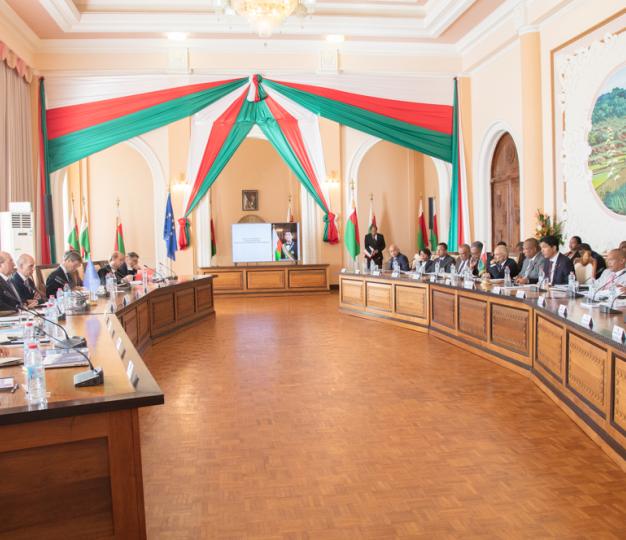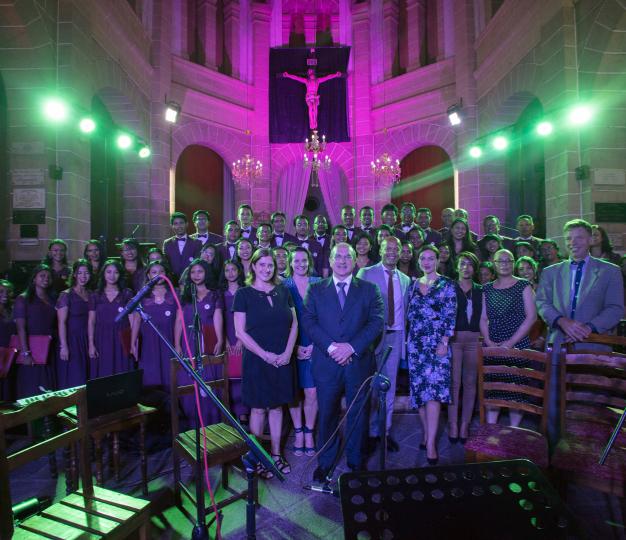The European Union and Madagascar
The relations between Madagascar and the European Union take place within the framework of the Cotonou Agreement which establishes a comprehensive partnership based on political, economic and trade cooperation, as well as development cooperation. The Cotonou Agreement, adopted in 2000 for a period of 20 years, was originally due to expire in February 2020, but its terms have been extended until 30 November 2021. It will be replaced by a new agreement.
Political Relations
Pursuant to article 8 of the Cotonou Agreement, a periodic political dialogue takes place between the Malagasy authorities and the European Union’s Delegation and Member States in order to exchange information, encourage mutual understanding and facilitate the definition of shared priorities. This dialogue covers first and foremost the values and fundamental principles mutually shared by the European Union and Madagascar, as well as all matters of general or regional interest.
In addition, the European Union supports the holding of democratic elections through specific projects to aid the electoral process, and through the deployment of electoral observation missions (EMM).
Finally, the European Union’s involvement and action, simultaneously, has a more important role for civil society, as an essential component of democratic governance and effective partnership for development.
Economic and Trade Relations
It enjoys close relations with the Great Island via cooperation instruments, regular dialogue and specific agreements.
The development of bilateral exchanges with third countries is one of the main axes of the European Union’s external trade. These are made concrete through free-trade agreements. Europe is the first destination for Malagasy exports – 45% of the Great Island’s exports are to the EU, while 20% of its imports come from the EU.
The economic and trade partnership aims to contribute to the growth in productive investments, to the creation of jobs in Madagascar and to the competitiveness of the Malagasy economy.
In addition, the European Union delegation has since 2014 organised the Economic Round Table, which brings together high-level authorities, the private sector and the main technical and financial partners in order to discuss the difficulties encountered and the challenges left to overcome relating to the business environment and the under-exploited opportunities of the European and regional markets. The Delegation also works to strengthen private-private and public-private dialogue.
Regional Relations
As the Cotonou agreement aims to facilitate the integration of the global economy, the EU supports efforts for economic agreements through the implementation of Economic Partnership Agreements (EPA). EPA aims to intensify and facilitate trade flows between Madagascar, the subregion, the European Union and Africa. The COMESA Summit, held in Antananarivo in October 2016, the signing of the tripartite COMESA-EAC-SADC agreement in July 2017, as well as Madagascar’s support for the project of an intercontinental EU/AU free-trade zone, all constitute important measures for stimulating interregional trade with the objective of increasing Malagasy exports. It is also to this end that the EU supports training at the Regional Maritime Information Fusion Centre (RMIFC): to collect and analyse maritime data, respond collectively to criminal offenses at sea, but also, in order to support Madagascar’s natural resources. Going beyond the strict conception of maritime security, the RMIFC and the surrounding countries’ liaison officers constitute a mutual aid platform.
Humanitarian Aid
Madagascar is the 5th most vulnerable country to climate change and has faced for several years a multiplication of extreme events linked to climate variations, regularly prompting humanitarian emergencies. As agriculture is the main means of subsistence for a majority of Malagasy, poor harvests resulting from drought or floods worsen the food insecurity and malnutrition levels of a large part of the population. From 1959 to this day, the EU has been systematically providing support to the victims of natural disasters, through the Directorate General for Humanitarian Aid and Civil Protection (DG ECHO). In cooperation with its partners, ECHO regularly monitors the humanitarian situation in Madagascar. In the event of an emergency, and on the basis of an evaluation of needs, it can decide to finance humanitarian operations to meet immediate needs in terms of food, access to water and sanitation, basic health care, or even to help the population to restore its means of subsistence.
Cultural and Scientific Relations
Cultural diversity is an intrinsic part of these values and represents an important element of the EU's role on the international stage.
To reinforce cultural relations between Madagascar and the EU, the Delegation supports and organises cultural events, for instance during Europe Day’s celebration activities. The cultural dimension of our relations also involves science and higher education. Through research and innovation, the EU intends to support Malagasy democracy and help the Malagasy people to invest in knowledge as the foundation of future development. With Malagasy organisations taking part in the HORIZON 2020 framework programme, the EU provides support to local science and innovation, the latter being a very dynamic sector in need of structures and financing. Madagascar actively takes part in the EU’s research and development programmes covering the scientific fields of energy (EuroBioRef), food and biotechnology, social sciences (NOPOOR) and international cooperation. Many Malagasy researchers are recipients of the Marie Sklodowska-Curie scholarships. The University of Antananarivo has participated in the Erasmus programme for several years. The network of Erasmus alumni stands ready to share their unique personal experiences of this programme.
Development Cooperation
Through national programmes under the European Development Fund, the EU and Madagascar have, since 1959, accomplished important and lasting achievements within the framework of a National Indicative Programme (NIP). The EU is also present in Madagascar, with interventions – especially infrastructure - funded by the European Investment Bank, as well as bilateral aid provided by the Member States.
In addition to this development aid, the EU has several thematic programmes from which Madagascar benefits: Global Fund for Education and GAVI alliance for vaccination, Human rights, civil society and local communities support projects, but also Climate Change and Environment. We must also mention regional cooperation financed by the EDF and channelled by the Indian Ocean Commission, the SADC and the COMESA that support the regional economic integration agenda while aiming at fighting against poverty. From 2021 onwards the EU wants to further improve the efficacy of its development aid by operating within the framework of joint programming with its member states, thereby better addressing the needs and priority objectives defined by the Republic of Madagascar.




